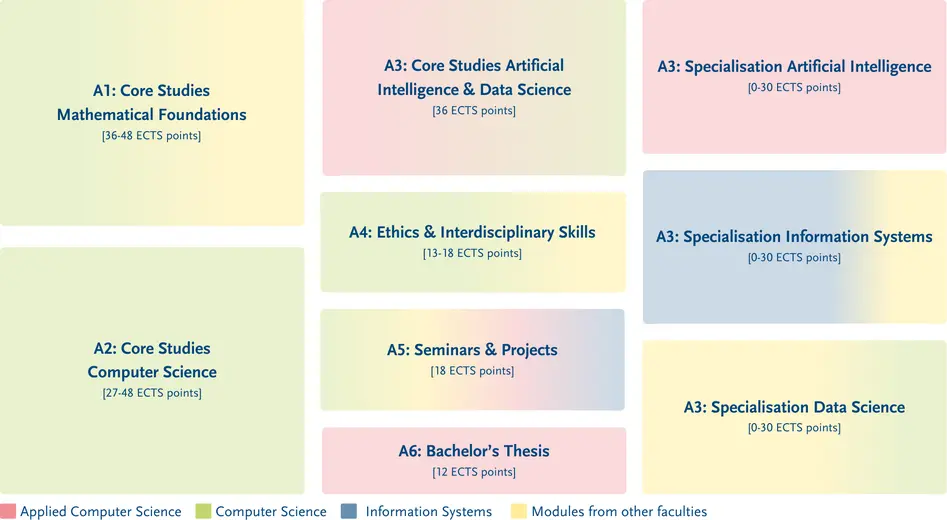Structure and Curriculum
Der Bachelorstudiengang KI & Data Science führt nach einer Regelstudienzeit von 6 Semestern mit 180 erworbenen ECTS-Punkten zum Abschluss Bachelor of Science (B.Sc.). Der Studiengang bietet sehr gute M?glichkeiten zur Schwerpunktsetzung und zur individuellen Ausrichtung der Lehrinhalte auf pers?nliche Interessen. Erm?glicht wird dies neben zahlreichen Wahlangeboten, z.B. im Fachstudium Mathematik und im Fachstudium Informatik, vor allem durch die drei Profilbereiche "Data Science", "Allgemeine KI" und "Wirtschaftsinformatik" als Teil des Fachstudiums KI & Data Science.
The bachelor's degree programme in AI & Data Science leads to a Bachelor of Science (B.Sc.) degree after a standard period of study of 6 semesters with 180 ECTS credits earned. The course offers very good opportunities to focus on specific areas and to tailor the course content to individual interests. This is made possible by numerous electives, e.g. in Mathematics and Computer Science, and above all by the three profile areas "Data Science", "Artificial Intelligence" and "Information Systems" as part of the AI & Data Science degree program.
Profile Areas
The profile areas are represented by the following chairs and professorships, from whose range of subjects the topic of the Bachelor's thesis is usually to be chosen:

Artificial Intelligence (WIAI, Applied Computer Science)
- Computer Graphics
- Explainable Machine Learning
- Fundamentals of Natural Language Processing
- Information Visualization
- AI Systems Engineering
- Cognitive Systems
- Cultural Informatics
- Media Informatics
- Human-Computer Interaction
- Multimodal Intelligent Interaction
- Natural Language Generation and Dialogue Systems
- User Experience and Design

Data Science (SoWi, Statistics Institute)
A1: Core Studies Mathematical Foundations
In the courses of module group A1, basic mathematical and theoretical facts relevant to the study of AI & DS are taught. This includes, in particular, knowledge of statistics, analysis, linear algebra and logic.
A2: Core Studies Computer Science
Module group A2 includes an introduction to computer science and other basic lectures on computer science. The content taught here prepares students for further courses and addresses algorithms and data structures, programming and databases in particular. In addition to a compulsory core, there are elective options that offer specializations in areas such as data communication, programming complex systems and functional programming or the fundamentals of software development.
A3: Core Studies Artificial Intelligence and Data Science
In module group A3, all students take introductory courses on relevant topics, including artificial intelligence, machine learning, knowledge representation and reasoning, as well as data engineering. In addition, modules from the subjects of the profile areas "Data Science", "Artificial Intelligence" and "Information Systems" can be selected as specializations. This group of modules allows students to focus on areas of specialization that result in attractive, future-oriented profiles.
A4: Ethics and Interdisciplinary Skills
The interdisciplinary courses in module group A4 serve to acquire basic skills in scientific work and ethics. It is also possible to acquire foreign language skills and to take further modules on philosophy/ethics and general key qualifications.
A5: Seminars and Projects
In module group A5, students attend seminars and projects that deepen and apply the content of module groups A1 to A4. In particular, specific questions from module groups A3 and A4 are expanded and discussed as part of the courses. The courses also prepare students to work systematically in a team and thus promote key qualifications such as the presentation of work results or the targeted processing of practically relevant projects.
A6: Bachelor's Thesis
Module group A6 is used to work independently on a topic from a subject and profile area as part of the Bachelor's thesis.
Proceed to Admission and Enrolment

